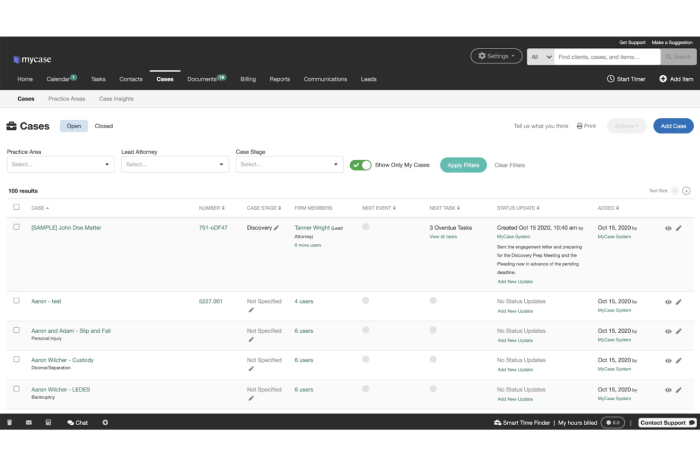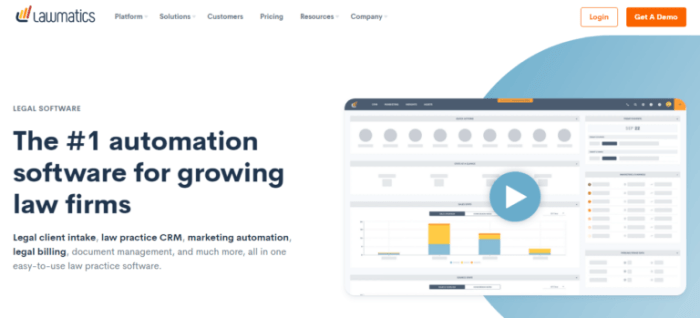Best crm software for law firms – Choosing the right Customer Relationship Management (CRM) software is crucial for law firms of all sizes. A robust CRM system can streamline operations, improve client communication, boost efficiency, and ultimately contribute to a more profitable practice. This comprehensive guide explores the best CRM software options specifically designed to meet the unique needs of the legal profession, considering factors like case management, document storage, billing, and client communication.
Key Features to Look for in a Law Firm CRM
Before diving into specific software, let’s Artikel the essential features a law firm CRM should possess. The ideal system will integrate seamlessly into your existing workflow, rather than disrupting it.
Essential Features:, Best crm software for law firms
- Contact Management: Efficiently manage client information, including contact details, communication history, and case details. Look for features like custom fields to accommodate specific legal requirements.
- Case Management: Track cases from initiation to conclusion, managing deadlines, tasks, and associated documents. Robust case management features are paramount for legal professionals.
- Document Management: Securely store and access legal documents, ensuring compliance with data privacy regulations like GDPR and CCPA. Integration with cloud storage services is highly beneficial.
- Time Tracking & Billing: Accurately track billable hours and generate invoices efficiently. The system should support various billing methods and integrate with accounting software.
- Communication Tools: Facilitate seamless communication with clients and colleagues through integrated email, calendar, and potentially even video conferencing.
- Reporting & Analytics: Generate insightful reports on key performance indicators (KPIs) to track progress, identify areas for improvement, and make data-driven decisions.
- Security & Compliance: Ensure the chosen CRM adheres to strict data security standards and complies with relevant legal regulations. Data encryption and access controls are critical.
- Integration Capabilities: Seamlessly integrate with other essential software used by the law firm, such as practice management software, accounting software, and e-signature tools.
- Mobile Accessibility: Access client information and manage tasks on the go through a user-friendly mobile app.
Top CRM Software Options for Law Firms
The market offers various CRM solutions catering to the legal industry. Here are some of the leading contenders, each with its strengths and weaknesses:
1. Clio Manage
Clio Manage is a popular choice among law firms, known for its robust case management features, time tracking capabilities, and seamless integration with other legal technologies. It offers excellent client communication tools and robust reporting functionalities. It’s particularly well-suited for smaller to mid-sized firms.
2. MyCase
MyCase is another strong contender, offering a comprehensive suite of features, including client portals, document management, and integrated billing. Its user-friendly interface makes it accessible to users with varying levels of technical expertise. It’s a good option for firms seeking a user-friendly and feature-rich solution.
3. PracticePanther
PracticePanther is designed to streamline legal workflows, offering features like time tracking, billing, and case management. It’s praised for its intuitive interface and strong reporting capabilities. It provides a good balance between functionality and ease of use.
4. CosmoLex

Source: revopsteam.com
CosmoLex is a comprehensive legal practice management software that includes robust CRM functionality. It’s known for its advanced features, including trust accounting and integrated billing. It’s a good choice for larger firms with complex needs.
5. CaseFox

Source: webfx.com
CaseFox provides a user-friendly platform with a focus on simplifying case management and client communication. Its affordability makes it a viable option for smaller firms on a budget. While feature-rich, it may lack some of the advanced functionalities of other options on this list.
Choosing the Right CRM: Factors to Consider
Selecting the best CRM for your law firm requires careful consideration of several factors:
- Firm Size and Structure: A small solo practice will have different needs than a large corporate law firm. Consider the number of users, cases handled, and overall complexity of operations.
- Budget: CRM software comes with varying pricing models, from subscription-based fees to one-time purchases. Determine your budget and explore options that align with your financial constraints.
- Integration Needs: Assess your existing software infrastructure and identify any integration requirements. The chosen CRM should seamlessly integrate with your accounting software, e-signature tools, and other essential applications.
- User-Friendliness: Opt for a system that is intuitive and easy to use for all members of your team, regardless of their technical expertise. A steep learning curve can hinder adoption and reduce efficiency.
- Scalability: Choose a CRM that can grow with your firm. Consider your future needs and ensure the chosen system can accommodate expansion without significant disruption.
- Customer Support: Reliable customer support is crucial, especially when dealing with complex technical issues. Research the provider’s support options and ensure they meet your needs.
Frequently Asked Questions (FAQ)
- Q: What is the average cost of CRM software for law firms?
A: The cost varies greatly depending on the features, number of users, and provider. Expect to pay anywhere from a few hundred dollars per month to several thousand dollars per year. - Q: How long does it take to implement a new CRM system?
A: Implementation time depends on the complexity of the system and the firm’s size. It can range from a few weeks to several months. - Q: Can I integrate my existing accounting software with a CRM?
A: Many CRM solutions offer seamless integration with popular accounting software. Check the provider’s website for a list of compatible applications. - Q: What security measures should I look for in a law firm CRM?
A: Look for features like data encryption, access controls, regular backups, and compliance with relevant data privacy regulations (GDPR, CCPA). - Q: What are the benefits of using a CRM for my law firm?
A: Benefits include improved client communication, streamlined workflows, increased efficiency, better case management, improved billing accuracy, and data-driven decision-making.
Conclusion
Selecting the right CRM software is a significant investment for any law firm. By carefully considering the features, cost, and integration needs, you can find a solution that streamlines your operations, enhances client relationships, and ultimately contributes to the success of your practice. Remember to leverage free trials and demos to thoroughly evaluate different options before making a final decision.
Resources:
Call to Action
Ready to optimize your law firm’s efficiency and client relationships? Start your free trial of [mention a specific CRM or link to a comparison site] today and experience the transformative power of a well-integrated CRM system!
Question & Answer Hub: Best Crm Software For Law Firms
What is the average cost of CRM software for law firms?
Costs vary greatly depending on the features, number of users, and vendor. Expect to see pricing models ranging from subscription-based fees to one-time purchases, with monthly costs potentially ranging from a few hundred to several thousand dollars.
How can I integrate my CRM with existing law firm software?
Many CRM systems offer API integrations or readily available connectors for common legal software. Check the CRM’s compatibility list or contact the vendor to determine integration options for your specific applications.
What data security measures should I look for in a law firm CRM?
Data security is paramount. Look for CRMs with robust encryption, access controls, data backups, and compliance certifications such as HIPAA or SOC 2, particularly important given the sensitive nature of legal client information.
What are the key features of a good CRM for a solo practitioner?
A solo practitioner needs a user-friendly, intuitive system with strong contact management, calendar features, and basic task management. Ease of use and affordability are key considerations.
